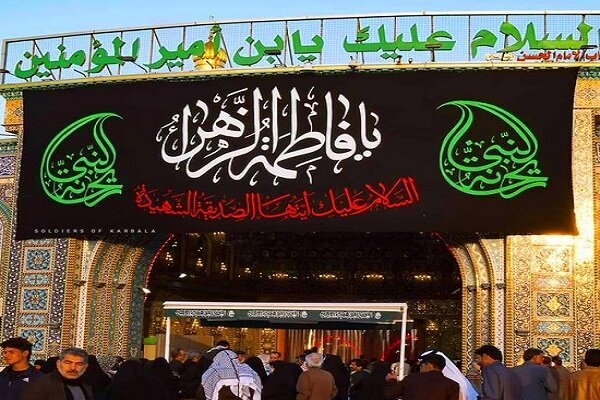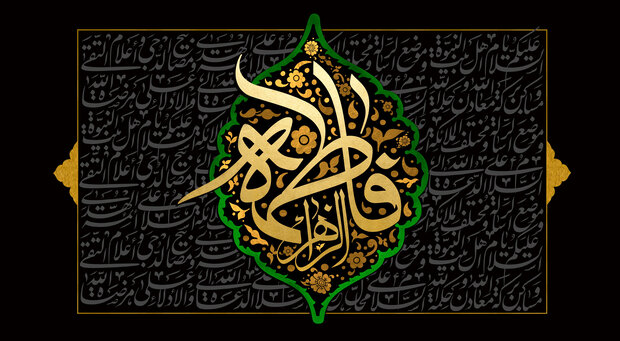Hazrat Zahra (SA), or Fatemeh or Fatima, was the daughter of Prophet Mohammad (PBUH) and the wife of Imam Ali (AS), the first Shia imam. She was the mother of Imam Hassan (AS) and Imam Hossein (AS), the second and third Shia imams, respectively.
According to popular Shia opinion, she was born in the 5th year after bi'tha (the beginning of the prophetic mission).
Fatima was actively involved in various social and political matters, including the migration to Medina, supporting the Prophet during the Battle of Uhud, supplying him at the Battle of Khandaq, and accompanying him during the Conquest of Mecca. She earned the title Az-Zahra', meaning "the glowing one," and was affectionately called Umm Abiha, or "mother of her father," due to her deep care for the Prophet, especially after her mother's passing. Other titles include Seddiqeh, Tahereh, Mobarakeh, Batool, Razieh, and Marzieh.
Raised in the prophetic household of her father Muhammad (PBUH) and mother Khadijah (RA), Fatima witnessed her father's struggles and supported him throughout her life. The Prophet emphasized her education, making her an ideal for all women in Islam. She embodied devotion, purity, and obedience to God, closely resembling her father in character.
Fatima is recognized as the "Leader of all the women of the world," as her presence was crucial to the enduring legacy of Prophethood. She exemplified the roles of daughter, wife, and mother, and was known for her generosity, never turning away anyone in need. She raised remarkable children whose legacies endure.

Lady Fatima taught the importance of patience in the face of adversity, enduring significant challenges, including attacks on her family. Her sermon, known as Fadakiyeh, reflects her profound understanding of monotheism and her insights into the Prophet and the Imamate.
The marriage between Imam Ali (AS) and Lady Fatima (AS) is often cited as the ideal in Islam, characterized by piety, humility, and mutual respect. Imam Ali (AS) expressed deep love for Fatima (AS), stating, “When I looked at her, my griefs and sorrows were relieved.” Despite the common practice of polygamy, he remained loyal to her, never marrying another woman during her lifetime.
Shia belief holds that Lady Fatima (AS) was martyred rather than dying a natural death, due to injuries she sustained. The Prophet Muhammad (PBUH) emphasized her significance, stating, "Whoever injures Fatima, injures me; and whoever injures me injures Allah." He described her as "a piece of my heart."
Lady Fatima's (SA) legacy extends far beyond her immediate family; it encompasses a profound influence on Islamic thought, ethics, and the role of women in society. Her life serves as a beacon of moral integrity and resilience, inspiring countless generations to uphold justice and compassion. In her actions and teachings, Fatima (SA) emphasized the significance of social justice, advocating for the downtrodden and marginalized. Her unwavering commitment to her principles in the face of adversity established her as a symbol of strength and dignity.
The teachings of Lady Fatima (SA) resonate deeply within the framework of Islamic values, particularly in her emphasis on the importance of education and knowledge. She encouraged her children and those around her to seek understanding and wisdom, fostering a culture of enlightenment that remains essential in the Muslim community. Her sermons, particularly the Fadakiyeh, are not only a testament to her eloquence but also a reflection of her profound grasp of theological concepts, including the nature of God, the significance of the Imamate, and the rights of individuals within society.
Fatima's (SA) relationship with her husband, Imam Ali (AS), is often highlighted as a model of marital harmony and partnership. Their mutual respect and shared commitment to their faith created a nurturing environment for their children, Imam Hassan (AS) and Imam Hossein (AS), who would go on to play pivotal roles in Islamic history. The household of Fatima and Ali (AS) is celebrated for its atmosphere of love, spirituality, and devotion, serving as a prototype for Muslim families seeking to emulate their values.
Furthermore, the trials that Lady Fatima (SA) faced after the Prophet's (PBUH) passing, including her struggles for her rightful inheritance and the protection of her family, underscore her courageous spirit. These events are not merely historical accounts; they are lessons in perseverance and the importance of standing firm in one's beliefs, even when faced with overwhelming opposition. Her life story encourages individuals to advocate for justice and equity, embodying the principles of Islam that call for the protection of rights and dignity.
In contemporary discourse, The Leader of the Islamic Revolution Ayatollah Seyyed Ali Khamenei has called for Lady Fatima (SA) to be a role model in social and revolutionary contexts emphasizing her relevance in today's world. Her life and teachings provide a framework for addressing modern challenges, advocating for gender equality, and social justice, and active participation in societal reform. By embodying the principles of compassion, integrity, and resilience, Lady Fatima (SA) continues to inspire individuals across diverse backgrounds to strive for a more just and equitable world.
Ultimately, the legacy of Hazrat Zahra (SA) is a testament to the enduring power of faith, love, and sacrifice. Her life serves as a reminder that true leadership is rooted in humility, service, and unwavering commitment to the ideals of justice and compassion.

As Muslims reflect on her contributions, they are reminded of the profound impact one individual can have on the course of history and the importance of embodying her values in their own lives.
Fatima passed away at 18, following several traumatic events, including an attack on her home and the loss of her child. The date of her martyrdom is traditionally observed as either 75 or 95 days after the Prophet's death, depending on the narration. She was buried in Baqi' Cemetery, between the Prophet's pulpit and his house, which he described as a garden of paradise.
Each year, Shia Muslims commemorate her martyrdom with mourning ceremonies, displaying black flags at the shrines of Shia Imams, and engaging in charitable acts to honor her legacy.
The mourning rituals observed by Shia Muslims in remembrance of Lady Fatima (SA) reflect a collective acknowledgment of her sacrifices and contributions. These ceremonies serve not only as a means of honoring her memory but also as an opportunity for communal reflection on the values she represented.
The display of black flags and the emphasis on charitable acts during these observances reinforce the notion of solidarity within the community, highlighting the enduring impact of her legacy.
Reported by Tohid Mahmoudpour

























Your Comment